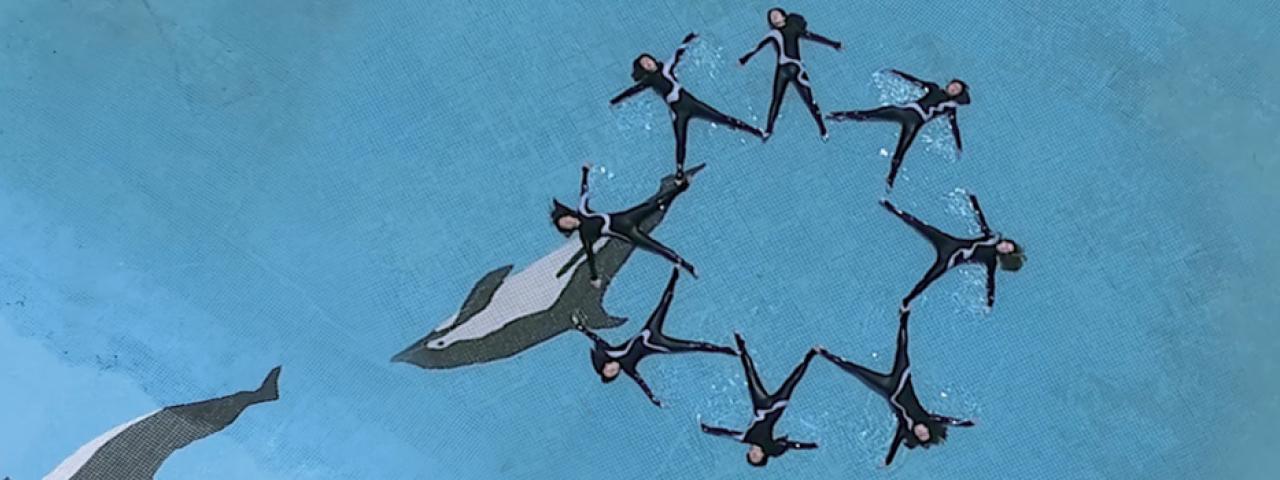
When NYU Shanghai’s dance program opened in the spring of 2016, the majority of students in Professor Aly Rose’s Dance and Choreography & Performance classes enrolled with no previous movement experience. A semester later, they were performing in some of Shanghai’s leading art venues.
“It is my strong conviction that there is a dancer in every student,” said Rose. “My teaching philosophy is to give each student a set of trained skills in a safe, stimulating and challenging environment that can manifest the artist within.”
Under Rose’s tutelage, students largely majoring in business, finance, economics or interactive media arts, take part in high-profile dance performances and collaborations with her professional dancers at venues including the Long Museum, ShanghART Gallery and Shanghai’s Museum of Contemporary Art (MoCA).
Transformational Performances
From the onset, the program rigorously challenges misconceptions of dance as an escapist elective.
The program’s general Dance class includes a history component while the Choreography & Performance class includes a dance analysis component. The core of the program integrates technique classes, structured explorations in the creative process, and cross-departmental collaborations that culminate in public performances.
For Rose, performance is part of the learning process: “Stage lights up, music cued, the audience in their seats, and then the student walks on stage. All eyes on them. They become that dancer. And it's transformational,” she said. “Performances also serve as a bridge to engage in dialogue with the local community, as a platform for further education, and provide exceptional experiences for students to gain recognition and professional opportunities for future work.”
A weekend creative workshop combining the solos, duets, and group work of the NYU Shanghai Choreography class and Rose's professional dancers, resulted in the creation of a large piece entitled Cell, that was then selected to perform at the 18th International Dance Festival in Shanghai.
“Who says non professionals or novices can't make good work? There is so much beauty in their raw movement, the bodily expression of those feelings, so deserving of appreciation," she said.

Discipline and self-empowerment
Far from being disconnected from the academic curriculum, Rose asserts that studying and practicing dance at university helps students develop skills that will help them with their current studies and future careers.
“It’s really important for students to realize how powerful they are in their bodies. It’s amazing to see them go from self-conscious and and at times, lacking confidence to full-fledged creators. Moving through self doubt is an intrinsic part of the whole process of creation,” said Rose.
According to Rose, in dance we reconnect to ourselves and to others, moving students beyond their phones, fears and perceived limitations to a place of cross-cultural team building and innovation — whether bodily, organizationally or technologically based.
“It’s very much training you to be present in the here and the now, which is so critical for mental health. It’s about releasing your negative thoughts, shutting out the noise so you can focus and just create something,” she said.
Growing Arts Programming
Over the last four years, NYU Shanghai has been steadily increasing its offerings in the arts. Each year, more than two hundred students have participated in Dance, Studio Art, and Voice, reporting incredible satisfaction with these courses and consistently demanding a more diverse group of arts offerings.
This coming academic year will see a dramatic increase in curriculum to meet the growing demand. For the Dance program, this means new classes in Ballet and Minority & Chinese Folk Dances, in addition to Dance and Choreography & Performance.
“With these new classes, Dance class can now focus on modern, contemporary and experimental theater that will allow us to do more edgy work,” said Rose.
For NYU Shanghai students wishing to minor in dance, it is now possible. After Rose’s Dance and Choreography & Performance classes were accepted as credit towards a dance minor at NYU Tisch earlier this year, students can now complete half their dance minor at NYU Shanghai, and the other half during their study away year.

You can find out more about these classes in the Academic Bulletin and on Albert, NYU's Student Information System.
In Pictures: Dance for Camera
Read more:
Stories: NYU study away student Emma Quong discusses creating her own works at NYU Shanghai
Q&A: Can performances by ‘non-professional’ dancers still be art? Student Vivian Zhu talks to Aly Rose

